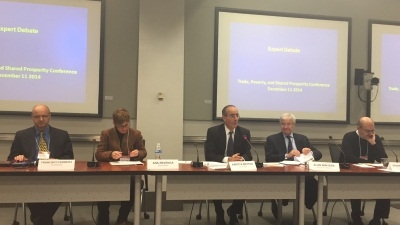On December 10-11, the World Bank’s research department held the Trade, Poverty, and Shared Prosperity Conference. The two-day event convened leading academics and senior policy experts to dissect the relationship between trade and household welfare, and identify policies that can accelerate progress toward the Bank’s twin goals of reducing extreme poverty and boosting shared prosperity.
Participants addressed a range of questions that included: Does openness exacerbate volatility? How do labor mobility costs vary across different countries? How do food prices affect poverty? The conference’s agenda included sessions on household welfare and poverty, the labor market, and crime and conflict.
“Trade liberalization has tremendous potential to catalyze development,” said World Bank Director of Research Asli Demirguc-Kunt, who delivered the conference’s opening remarks. “But how will increased integration impact poverty and inequality? How can globalization be harnessed to reduce poverty and boost shared prosperity?”
The sessions began with researchers exploring the ways in which greater integration into the global economy affects prices, consumption, and income. Benjamin Faber (University of California, Berkeley) analyzed data drawn from barcode scans to study the impact of foreign supermarket entry on local social welfare in Mexico. Faber found that these supermarkets reduced the cost of living, resulting in gains of 7 percent of the initial social welfare level. “20 percent of these gains came from the pro-competitive effect on the prices of domestic retailers, while 80 percent of the effect was due to the direct price index effect of foreign entry,” Faber said. Will Martin (World Bank) discussed the way that rising food prices can disproportionately burden poor populations in the short-term, while benefiting them, as producers of agricultural products and sellers of unskilled labor, in the long-term.
Countries with more flexible labor markets face lower adjustment costs and hence are able to respond more easily to global economic pressures. Erhan Artuc (World Bank) compared the costs of labor mobility in different countries in Latin America and in Sub-Saharan Africa. Artuc found that in low-income countries the costs are high, while high-income countries enjoy low moving costs and a high speed of adjustment. The source of this high cost in lower-income countries could be due to “their industrial structure and the skill composition of workers.” Ann Harrison (Wharton School, University of Pennsylvania) presented research on how globalization has contributed to American workers shifting from manufacturing jobs to lower-paid services jobs. Harrison concluded that globalization has “little impact on wages at the industry level, so policy makers need to focus on occupational exposure.”


